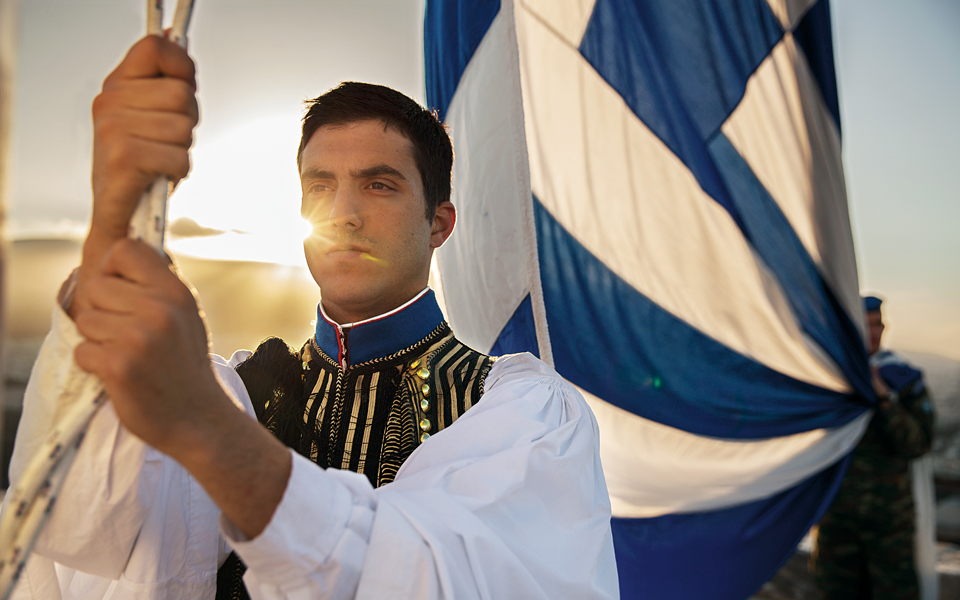Sunday morning at the Acropolis and the sun is just starting to make an appearance. As much of the city slumbers, a Presidential Guard unit marches up the sacred rock to raise the flag, a mystical, 20-minute ceremony encompassing the nation’s history, collective memory, traditions and symbols.
The marching band and the Evzones, presenting arms, take up position by the flagpole. The silence is palpable. At precisely 8 o’clock church bells chime from afar, summoning the faithful to morning mass. The band strikes up the national anthem as the flag is raised, sending a frisson through the few onlookers that have been granted attendance, as here, in this moment, we witness a symphony of all the things that make Greeks proud of their heritage: ancient grandeur, opposition to oppression, faith, symbolism – and Athens shimmering in the morning light.
It is this deluge of emotion that brought Pantelis here. A retired bus driver, he used to serve as an Evzone – and like many met his wife while on guard duty – and 50 years on tries to attend the Sunday ceremony as often as possible.
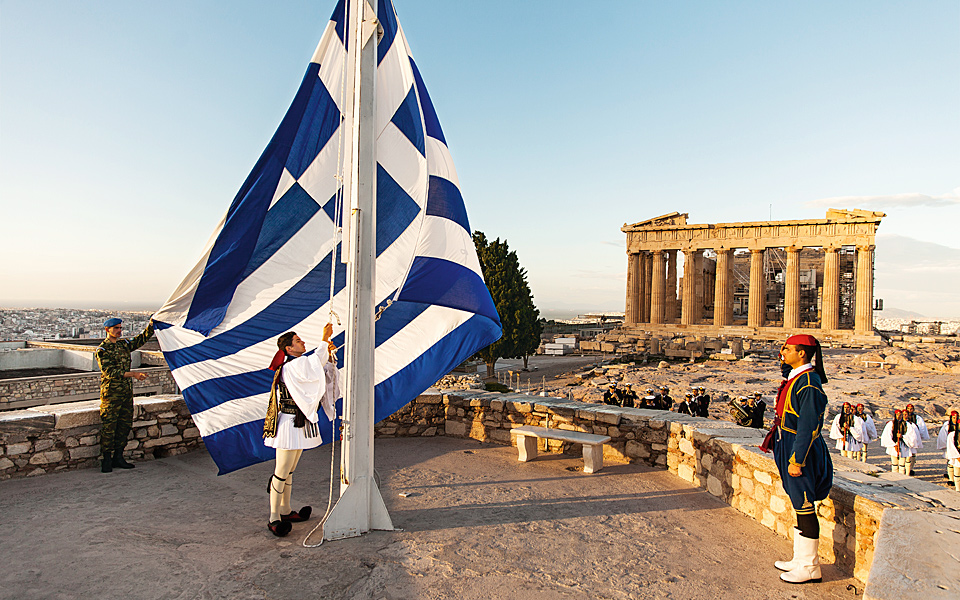
© Dimitris Vlaikos
“We witness a symphony of all the things that make Greeks proud of their heritage: ancient grandeur, opposition to oppression, faith, symbolism”
A few hours later, the somber mood is replaced by the Presidential Guard’s most impressive weekly display: the 11 o’clock changing of the guard (repeated in simpler form every hour), which takes on a more festive, yet formal, character as the full complement of Evzones parades from their base on Irodou Attikou Street near the Presidential Mansion to Syntagma Square, applauded and photographed by crowds of foreigners and Greeks of all ages who gather for the colorful spectacle. Some of the boys among them will inevitably dream of becoming an Evzone one day, though they can hardly fathom what it entails or the honor of wearing the fustanella kilt. “You need to be at least 1.87m in height and in excellent mental and physical condition,” the unit’s commander, Colonel Aristeidis Iliopoulos, points out. “You also need conviction.”
The young men selected for the unit during their nine-month compulsory military service undergo rigorous training for a month in the “art” of remaining so still they look like real-life statues when on guard duty. They are not allowed to move come what may. They must look straight ahead and verbal communication is forbidden, though other means are used. One bat of the eyelids means “yes,” two mean “no” and three translates as “I don’t know.”
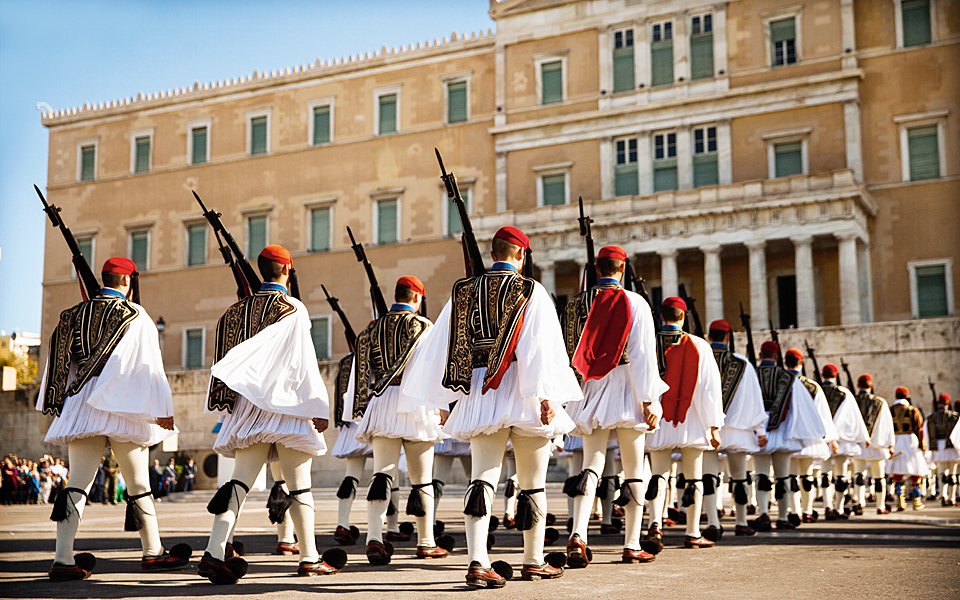
© Dimitris Vlaikos
“Evzones say a lot without uttering a word. That stillness is a very personal moment,” says former Evzone Stefanos Alexopoulos. “During guard duty at official ceremonies, you could be standing still for a few minutes to hours on end in rain, snow or sweltering heat. It is a test of both body and spirit. At training we were told to think beautiful thoughts, of landscapes, people and situations. I, for one, didn’t think of anything and just focused on my breathing. It was almost like meditating.”
Once a recruit is picked for the Presidential Guard, he is given a “brother,” in a match based on physical resemblance. They are inseparable from start to finish; they help each dress in uniform, stand guard together and are both absent if one gets sick. Evzone pairs become friends for life.
Soldiers in the Presidential Guard do not count down the days to their discharge like regular conscripts. “They put on the uniform and get goose bumps,” their commander says. And when the day comes, the first on duty, emotions inevitably run high. The same is true when they appear abroad in cities with a large diaspora Greek community. The biggest of these events is the annual parade marking the March 25 anniversary of the Greek War of Independence on New York’s Fifth Avenue.
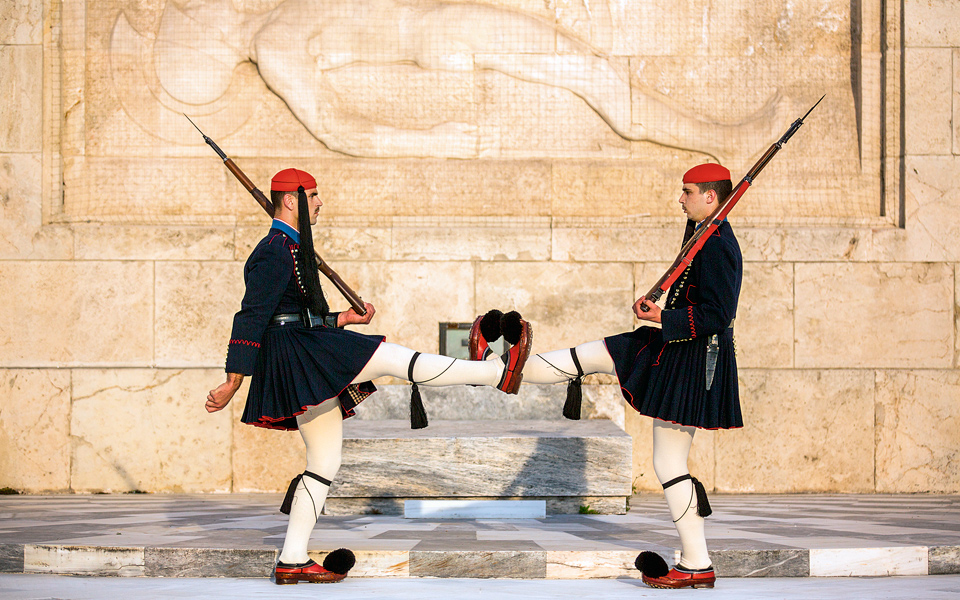
© Shutterstock
“Once an Evzone always an Evzone” is the official motto of the Presidential Guard
“We’re treated like comic book superheroes,” says Alexopoulos. “We see respect and pride in their eyes and they, in turn, see in us the country we’ve only left behind for a few days but they’ve left for years.”
“Once an Evzone always an Evzone” is the official motto of the Presidential Guard and one that follows the men throughout their lives. The years may go by and their hair may turn grey, but that doesn’t stop the members of the veterans association from paying regular visits to the unit’s base on Irodou Attikou Street. A chance encounter with a “brother” is usually an emotionally charged affair.
“We embraced and wept. So did our wives even though they’d never met before,” Pantelis says, recalling the time he met up with his partner after 38 years.
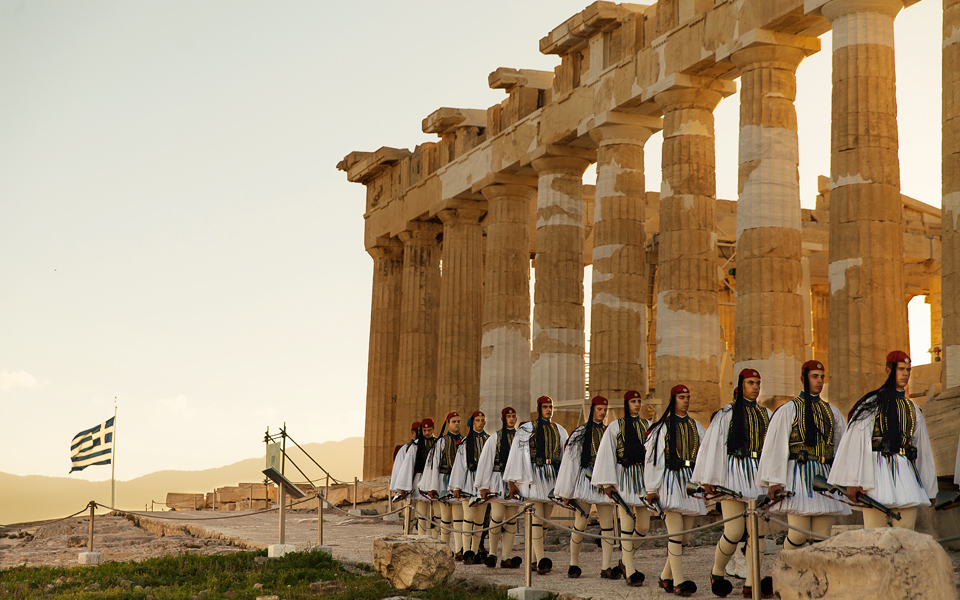
© Dimitris Vlaikos
BRIEF HISTORY
The Evzones unit was established in 1867 and was initially tasked with guarding the country’s borders and rooting out banditry. It was called a “light unit” because its members didn’t carry heavy arms and their fustanella gave them agility in combat, making them formidable opponents.
During the Balkan Wars (1912-13) and other armed conflicts that followed (World War I, Asia Minor campaign, World War II), the Evzones were sent on the most challenging of missions, fighting in difficult terrains and displaying great tenacity, daring and self-sacrifice – becoming a symbol of heroism in the public mind.
The Evzone detachment that went on to become the Presidential Guard was created in 1868 and tasked with protecting the royal family and its property. The king would later hail the special detachment as the benchmark which other Evzone units should aspire to reach.
Since 1929, the Evzones have played a purely ceremonial role, with their main duty being to guard the Tomb of Unknown Soldier, which was unveiled in front of Parliament in 1932 in memory of the country’s war dead.

